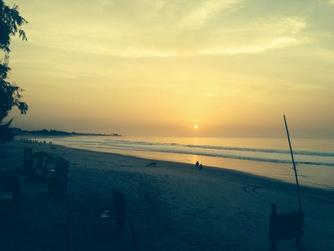 Photo by Sophie Wilson
Photo by Sophie Wilson A light mist rises from the sea; together with the setting sun it melts the beach and line of palms into a honeyed haze. Two horses thunder along the foreshore, churning up the backwash and effortlessly overtaking the persistent souls who insist on cycling through the sand. We sit on a raised platform under shady palm fronds, beers in hand, gazing along the curve of the bay filled with people working out or playing football. A child nearby is playing with an iPad, a row of tiny, inquisitive black heads propped up on the parapet behind her.
(At the bottom of this blog there is a YouTube clip that is fairly murky - I was still learning how to shoot at night - but you may want to listen to the music whilst you read the post to give you a flavour of the place)
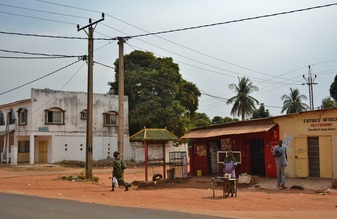 Local Chinese restaurant on the 'main' road
Local Chinese restaurant on the 'main' road Imagine the West African landscape of your dreams, all red dirt roads leading through jungle and scrub to beaches teased by Atlantic breakers. Now take that landscape, and dot it with concrete walled compounds, megahotels and purple signs every 15 metres enjoining you to sign up to Africell. This is the Gambia, where odd bits of modernity draw a thinly sketched façade over the bush that is still firmly in control between the scatter of buildings. As soon as you step off the paved roads the trees swallow you, birdsong covers the traffic, and time seems to fall away.
The Gambia is a historical mistake of a country, a small patch of land either side of a river that the British held on to in hopes of swapping it for somewhere better with the French. At best we can be said to have neglected it benignly, something that modern mass tourism has rectified with a vengeance. All along the coast planning laws have been thrown to the wind to create a bizarre semi-urban area where the bulk of the country now live, and where many package tourists come for exoticism without leaving the poolside.
The Gambia is a historical mistake of a country, a small patch of land either side of a river that the British held on to in hopes of swapping it for somewhere better with the French. At best we can be said to have neglected it benignly, something that modern mass tourism has rectified with a vengeance. All along the coast planning laws have been thrown to the wind to create a bizarre semi-urban area where the bulk of the country now live, and where many package tourists come for exoticism without leaving the poolside.
 Photo by Sophie Wilson
Photo by Sophie Wilson Our hotel was reached by following a sandy track through a wood, dotted with posh flats and ‘shops’ selling ‘art’. In most cases these were just places where locals hung out, trying to work out if they can do anything to please tourists and make some cash. Arriving to a fanfare of birds over the growling of Atlantic waves, we were shown to the honeymoon suite, a comfortable room that suffered only from a bathroom door that required some serious tricknology to shut, and a bed whose subsidence was so bad that we took to sleeping feet to the headboard to avoid the pit.
Still, it was cute that they had scattered petals on the bed and left us a bottle of wine. We weren’t actually married, but sex tourism is so prevalent in the Gambia that it seemed wise to protect Sophie’s virtue somewhat by sheltering her beneath my marital wing. Now it was actually earning us free shit. At this point, knocking back the eminently quaffable South African white, looking down through the palms to the breakers we could just make out, we decided to ride this Dry Run-eymoon for all it was worth.
Still, it was cute that they had scattered petals on the bed and left us a bottle of wine. We weren’t actually married, but sex tourism is so prevalent in the Gambia that it seemed wise to protect Sophie’s virtue somewhat by sheltering her beneath my marital wing. Now it was actually earning us free shit. At this point, knocking back the eminently quaffable South African white, looking down through the palms to the breakers we could just make out, we decided to ride this Dry Run-eymoon for all it was worth.
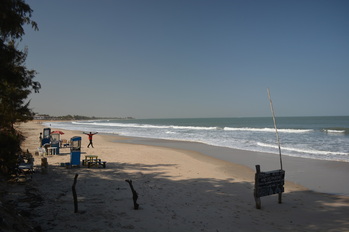 Carl shows off in front of his juice stand
Carl shows off in front of his juice stand We headed down to the beach. This was our first run in with Carl the juice salesman. A sixth finger that dangled flappingly from his right hand rather precluded him from the Gambian dream of meeting a wealthy European who would fall in love with him and whisk him away, so he concentrated on making juices and being ‘helpful’. On this occasion, he told us where to swim (“Where everyone else is swimming”) and where to avoid (“Where no-one is swimming”), and let us know he’d be happy to serve us juices any time we fancied.
We may have cursed the early morning flight when faced, pre-dawn, with our sour-faced harridan of a host (“Flights’ll probably be cancelled. Too much rain.”), but now, as we frolicked and gambolled through waves at lunchtime, it seemed inspired. The beach was practically empty, the weather was perfect, the sea warm. Ish. It was still the Atlantic. Yet the ocean smiled gaminely at us rather than glowering greyly, and we had a chance to decompress that afternoon and readjust to being somewhere completely different.
We may have cursed the early morning flight when faced, pre-dawn, with our sour-faced harridan of a host (“Flights’ll probably be cancelled. Too much rain.”), but now, as we frolicked and gambolled through waves at lunchtime, it seemed inspired. The beach was practically empty, the weather was perfect, the sea warm. Ish. It was still the Atlantic. Yet the ocean smiled gaminely at us rather than glowering greyly, and we had a chance to decompress that afternoon and readjust to being somewhere completely different.
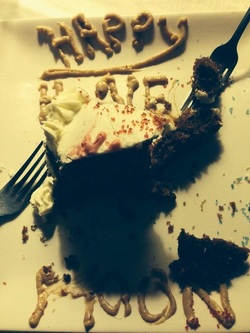 Photo by Sophie Wilson
Photo by Sophie Wilson Had we arrived that evening it would have been in the middle of a powercut, which made venturing through the forest to the main road a trip through time itself. Children laughed in the darkness, and the sounds were more African village than metropole. We stopped at the first restaurant we found, which naturally was run by a Moroccan celebrity chef. The décor was naturally suited to lamps and candles, all soft silks and plush furnishings, and the food was spectacular, if not entirely Gambian. Duck spring rolls had roasted peanuts added to increase authenticity, and the wise diner would be sure to order some captain fish, a local monster with a similar meaty texture to sea bass, which was succulent when steamed in banana leaves with ginger, coriander and chilli. Of course, being on our dry-runeymoon we got a free ginger and carrot cake desert that we certainly didn’t need but was bloody lovely.
It was also at the restaurant that we started to notice tourists’ ‘friends’. We were the only white people in the restaurant who didn’t have one or more black people sitting with them. What was particularly weird was that the Gambians and Europeans often made no attempt to talk to each other. They sat in two different worlds, the Gambians often tapping away on their smartphones looking indescribably bored.
It was also at the restaurant that we started to notice tourists’ ‘friends’. We were the only white people in the restaurant who didn’t have one or more black people sitting with them. What was particularly weird was that the Gambians and Europeans often made no attempt to talk to each other. They sat in two different worlds, the Gambians often tapping away on their smartphones looking indescribably bored.
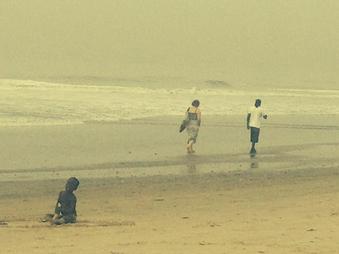 Photo by Sophie Wilson
Photo by Sophie Wilson In fact, as the days wore on, we would realise that this was the norm everywhere. It was expected you would have your own local fixer to book you taxis, and perhaps more importantly, keep other people away from you. I’m not sure what saddened me more, the people who would pay someone they didn’t like to cocoon themselves from all the other locals, and then travel round with them in tow whilst trying to ignore them, or the people who were so lonely they would see them as genuine friends or lovers, and spend hours giving unreciprocated chat to locals who were visibly calculating whether the value of the meal was worth listening to another story about how difficult it was to get a hairdryer to work out here.
A fixer seemed a little excessive, given how easy it was to get around without hiring your own taxi, as the main routes had a constant stream of shared taxis called ‘8-8s’ running along them. They got their name from the fact that every ride was eight dalasi (about 12p), and they were a great way to meet local people. Most assumed we must be working for VSO or some other NGO, as the impenetrable difficulty of catching an 8-8 was presumed to be beyond mere tourists. Given there were only two directions to go in, and it sometimes seemed every second vehicle was an 8-8, I didn’t really understand why more people didn’t do it.
A fixer seemed a little excessive, given how easy it was to get around without hiring your own taxi, as the main routes had a constant stream of shared taxis called ‘8-8s’ running along them. They got their name from the fact that every ride was eight dalasi (about 12p), and they were a great way to meet local people. Most assumed we must be working for VSO or some other NGO, as the impenetrable difficulty of catching an 8-8 was presumed to be beyond mere tourists. Given there were only two directions to go in, and it sometimes seemed every second vehicle was an 8-8, I didn’t really understand why more people didn’t do it.
To be fair, though, the constant attention could be a little wearying, with everyone we met offering us juices, massages, or anything they could possibly imagine they could make money from. It was all done in an unfailingly friendly manner, with lots of reminders that we were on “Africa’s Smiling Coast”, but even though it was sad to see the low level desperation, in general if you were friendly back but firm that you didn’t want anything, then things went well and it just became part of the culture.
We did get scammed once, but what was so weird was that we both knew from the very start that it was a scam, but there was something hypnotic about the whole thing that somehow kept us both involved to see how it would pan out. After one person had greeted us, loudly repeating our names and the fact we were recently married, another person shambled out of the undergrowth saying, “Simon! Sophie! You remember me from the hotel? You are on honeymoon, right?” When we replied that he had somehow slipped our attention, he became quite excitedly elaborate:
“I too am just married! In fact, I got married in your hotel! Yes, just the day before you came! Do you know Dave, at the hotel? [no] Afterwards he came up to me and said, tears streaming down his face, he said – this is the most beautiful ceremony I have ever seen. He was so happy, Mr Dave.”
After this he invited us to his compound to meet his wife. Despite this being an obviously terrible idea, we acquiesced. A friend appeared from nowhere, introducing himself as Jimmy the Fixer, and a truer scallywag I had never seen in my whole life. We started taking a very windy and inefficient path through the compounds, probably in an effort to make us feel disorientated. Despite giving each other various outs, neither of us quite had the willpower to just stop and leave. We could feel the scam coming, but how would it break?
Turning another corner, we came across twenty to thirty children playing in the dust. “Ah yes,” our soi-disant friend said, “these are the children our family looks after. Did I forget to mention that? I am so caught up in my marriage. It is so lucky I met you today, because tomorrow we are going on honeymoon so even if you came looking for me you would not be able to find me.” He barked some orders to the kids, who jumped up and swarmed round us, hands seeking ours, or just interested in touching the white skin. Was this to be it? Were they pickpockets? I kept my hands hovering over my wallet and camera as our merry group pushed on to the compound.
Inside a long suffering woman rolled her eyes and kept washing clothes as our group entered. The compound had high breezeblock walls like most of the others around it, and although it covered a large area, there were only two or three small buildings dotted around it, the rest of the area being the same scrub as outside the walls. We were ushered into one of the buildings, a single room mostly filled by a large double bed made grand by the mosquito net, an armchair and a sofa on its last legs.
“All the children sleep here. We take them all in because we are so charitable. It is hard because we are so poor, but our family are very generous.” There wasn’t enough room for all the children in the room when they were standing up, so they sat on each other’s knees or hovered outside the door. I’m not sure it was physically possible for them to sleep here. “Quick, bring refreshments for our guests!”
We were brought a Fanta, despite our protests. To be honest, this was the one scam I was particularly worried about, the old ‘slip-a-mickey-in-a-drink’ play. I didn’t want to wake up sans camera, wallet and clothes. He did bite the top off in front of us, which gave me some comfort but made Soph worry somewhat on account of hygiene. Still, she knocked some back, which meant I had to put my hand around the neck and pretend to drink. It wasn’t that I was making Sophie take one for the team, I just figured that it’d be better if only one of us passed out and she’d already volunteered, quite selflessly, I thought, for that role.
Still, our host was continuing. “My grandfather also lives in this compound. He is a very holy man. In fact, he is the most holy man in this area. Our President regularly comes to see him. In fact, your President Tonyblair also came to visit him. Everyone comes to pay respects to him because he is so holy and generous and deserving of respect. What, no, I’m afraid you can’t see him. He’s too… old. It is so hard for someone so old and poor and deserving of respect to have to buy so much rice for all these children. Can you imagine? Perhaps you could help?” [And suddenly the scam starts to come into view, I’m now regretting missing out on a free Fanta]
“If you could just buy us a little rice it would help us so much. Children, say ‘Thankyou Simon and Sophie’”
“Thankyou Simo Sofee.”
“Say ‘Thankyou for the rice.’”
“Thankyou for rice.”
He got them to chant this again and again whilst he fetched a worn jotter. “This is my grandfather’s book. Please write how much you will donate here so I can show it to my grandfather, and remember that he deserves a lot of respect so make sure whatever you write down you definitely give me because otherwise you will be disrespecting my grandfather who is the most holy man in Gambia!”
Throughout this the children continued to chant, more or less intelligibly, thankyous to us for buying them rice. Looking through the jotter I saw that many donors had been very generous, giving over a hundred pounds, and any claim that the handwriting of the most generous was somewhat similar is a bald faced lie that you should take back this very minute.
I said I was happy to buy them some rice, but seeing how expensive the honeymoon was, I couldn’t commit to the amounts listed here. I was happy to go to the shop and buy them a small bag. “Write it down! Write that you will buy a bag of rice in the book! For my grandfather, who is the most holy man in West Africa!” I wrote ‘some rice’ in the jotter, which was snatched greedily out of my hands. We were bustled out of the compound to a shop next door.
“The smallest bag is 3,000 dalasi [£50].”
“Really? I can’t afford that.”
“YOU WROTE IN THE BOOK! YOU MUST GIVE US 3,000 DALASI!”
“You really don’t sell any rice for less than 3,000 dalasi?” [Bearing in mind that’s over a month’s wage for most Gambians]
“She can’t speak. You must pay us 3,000 dalasi. It’s in my Grandfather’s book.”
“Listen, there is absolutely no way I am giving you 3,000 dalasi.”
“WHY ARE YOU DISRESPECTING MY GRANDFATHER!?!”
“WHY ARE YOU DISRESPECTING ME AND MY WIFE? We came to wish your new wife a happy honeymoon, now you are demanding money from us. Here’s 80 dalasi for rice. We’re going now.”
And suddenly all was smiles. I figured that 80 dalasi, whilst not much over a pound, would cover the cost of the Fanta and Jimmy the Fixer’s ‘fee’ for tagging along, whilst also saving face. We also decided that we would have a new code – whenever we felt that something was getting dodge, we would ask if it was time to go back to the hotel for Sophie to take her medication. We figured we could extract ourselves from any situation without causing offence by making it a medical emergency.
There were times when it was beneficial to have that excuse. One of the things that we had discovered in pre-holiday discoveries was how important wrestling is in Sene-gambian culture, infused with juju practices and the honour of the village. Indeed, even the inflight magazine had spoke of how amazing the experience was, and given us the number of a fixer who would take us to see some. Of course, on calling him he was utterly bemused, asking how we had got his number and being very non-specific about the possibility of seeing some.
We then asked the waitresses at our hotel. In general we found that guys tried to bullshit us, possibly in the hope that at some point they might make some money off of us in some unspecified way, whereas women were just honest. Straight off, they said they thought that it was probably out of season, but that if there was any going on, it would be this Sunday afternoon before sunset, and in a stadium they gave us directions to.
Naturally, having learnt well from my father, half-way along the route, brandishing the map from the guidebook and some unshakeable confidence, I explained I knew exactly where we were and that jumping off this 8-8 would be a great shortcut. It wasn’t. It did take us to a stadium, but everyone was playing football. We jumped in another 8-8 that swore he would take us to the wrestling stadium, but we made the cardinal mistake of not confirming that he would continue to be an 8-8, and as soon as the other passengers got out we turned into a ‘city taxi’ and set off onto the red dust roads that wove through the locals houses.
I still had a good idea of where we were, but from Sophie’s point of view we were now twisting through minor roads we’d never seen before, with a driver loudly declaiming that we should never trust Senegalese people, because they were always trying to scam you and should never be trusted, unlike the Gambians who were as honest as the day was long. At this point we suddenly remembered Sophie’s medical condition and got the car to stop next to a main road back into town. To be fair to the driver, there was another playing field on the other side of the road, but once again, they were playing football, not wrestling. It was almost as if it wasn’t the season for wrestling…
We did get scammed once, but what was so weird was that we both knew from the very start that it was a scam, but there was something hypnotic about the whole thing that somehow kept us both involved to see how it would pan out. After one person had greeted us, loudly repeating our names and the fact we were recently married, another person shambled out of the undergrowth saying, “Simon! Sophie! You remember me from the hotel? You are on honeymoon, right?” When we replied that he had somehow slipped our attention, he became quite excitedly elaborate:
“I too am just married! In fact, I got married in your hotel! Yes, just the day before you came! Do you know Dave, at the hotel? [no] Afterwards he came up to me and said, tears streaming down his face, he said – this is the most beautiful ceremony I have ever seen. He was so happy, Mr Dave.”
After this he invited us to his compound to meet his wife. Despite this being an obviously terrible idea, we acquiesced. A friend appeared from nowhere, introducing himself as Jimmy the Fixer, and a truer scallywag I had never seen in my whole life. We started taking a very windy and inefficient path through the compounds, probably in an effort to make us feel disorientated. Despite giving each other various outs, neither of us quite had the willpower to just stop and leave. We could feel the scam coming, but how would it break?
Turning another corner, we came across twenty to thirty children playing in the dust. “Ah yes,” our soi-disant friend said, “these are the children our family looks after. Did I forget to mention that? I am so caught up in my marriage. It is so lucky I met you today, because tomorrow we are going on honeymoon so even if you came looking for me you would not be able to find me.” He barked some orders to the kids, who jumped up and swarmed round us, hands seeking ours, or just interested in touching the white skin. Was this to be it? Were they pickpockets? I kept my hands hovering over my wallet and camera as our merry group pushed on to the compound.
Inside a long suffering woman rolled her eyes and kept washing clothes as our group entered. The compound had high breezeblock walls like most of the others around it, and although it covered a large area, there were only two or three small buildings dotted around it, the rest of the area being the same scrub as outside the walls. We were ushered into one of the buildings, a single room mostly filled by a large double bed made grand by the mosquito net, an armchair and a sofa on its last legs.
“All the children sleep here. We take them all in because we are so charitable. It is hard because we are so poor, but our family are very generous.” There wasn’t enough room for all the children in the room when they were standing up, so they sat on each other’s knees or hovered outside the door. I’m not sure it was physically possible for them to sleep here. “Quick, bring refreshments for our guests!”
We were brought a Fanta, despite our protests. To be honest, this was the one scam I was particularly worried about, the old ‘slip-a-mickey-in-a-drink’ play. I didn’t want to wake up sans camera, wallet and clothes. He did bite the top off in front of us, which gave me some comfort but made Soph worry somewhat on account of hygiene. Still, she knocked some back, which meant I had to put my hand around the neck and pretend to drink. It wasn’t that I was making Sophie take one for the team, I just figured that it’d be better if only one of us passed out and she’d already volunteered, quite selflessly, I thought, for that role.
Still, our host was continuing. “My grandfather also lives in this compound. He is a very holy man. In fact, he is the most holy man in this area. Our President regularly comes to see him. In fact, your President Tonyblair also came to visit him. Everyone comes to pay respects to him because he is so holy and generous and deserving of respect. What, no, I’m afraid you can’t see him. He’s too… old. It is so hard for someone so old and poor and deserving of respect to have to buy so much rice for all these children. Can you imagine? Perhaps you could help?” [And suddenly the scam starts to come into view, I’m now regretting missing out on a free Fanta]
“If you could just buy us a little rice it would help us so much. Children, say ‘Thankyou Simon and Sophie’”
“Thankyou Simo Sofee.”
“Say ‘Thankyou for the rice.’”
“Thankyou for rice.”
He got them to chant this again and again whilst he fetched a worn jotter. “This is my grandfather’s book. Please write how much you will donate here so I can show it to my grandfather, and remember that he deserves a lot of respect so make sure whatever you write down you definitely give me because otherwise you will be disrespecting my grandfather who is the most holy man in Gambia!”
Throughout this the children continued to chant, more or less intelligibly, thankyous to us for buying them rice. Looking through the jotter I saw that many donors had been very generous, giving over a hundred pounds, and any claim that the handwriting of the most generous was somewhat similar is a bald faced lie that you should take back this very minute.
I said I was happy to buy them some rice, but seeing how expensive the honeymoon was, I couldn’t commit to the amounts listed here. I was happy to go to the shop and buy them a small bag. “Write it down! Write that you will buy a bag of rice in the book! For my grandfather, who is the most holy man in West Africa!” I wrote ‘some rice’ in the jotter, which was snatched greedily out of my hands. We were bustled out of the compound to a shop next door.
“The smallest bag is 3,000 dalasi [£50].”
“Really? I can’t afford that.”
“YOU WROTE IN THE BOOK! YOU MUST GIVE US 3,000 DALASI!”
“You really don’t sell any rice for less than 3,000 dalasi?” [Bearing in mind that’s over a month’s wage for most Gambians]
“She can’t speak. You must pay us 3,000 dalasi. It’s in my Grandfather’s book.”
“Listen, there is absolutely no way I am giving you 3,000 dalasi.”
“WHY ARE YOU DISRESPECTING MY GRANDFATHER!?!”
“WHY ARE YOU DISRESPECTING ME AND MY WIFE? We came to wish your new wife a happy honeymoon, now you are demanding money from us. Here’s 80 dalasi for rice. We’re going now.”
And suddenly all was smiles. I figured that 80 dalasi, whilst not much over a pound, would cover the cost of the Fanta and Jimmy the Fixer’s ‘fee’ for tagging along, whilst also saving face. We also decided that we would have a new code – whenever we felt that something was getting dodge, we would ask if it was time to go back to the hotel for Sophie to take her medication. We figured we could extract ourselves from any situation without causing offence by making it a medical emergency.
There were times when it was beneficial to have that excuse. One of the things that we had discovered in pre-holiday discoveries was how important wrestling is in Sene-gambian culture, infused with juju practices and the honour of the village. Indeed, even the inflight magazine had spoke of how amazing the experience was, and given us the number of a fixer who would take us to see some. Of course, on calling him he was utterly bemused, asking how we had got his number and being very non-specific about the possibility of seeing some.
We then asked the waitresses at our hotel. In general we found that guys tried to bullshit us, possibly in the hope that at some point they might make some money off of us in some unspecified way, whereas women were just honest. Straight off, they said they thought that it was probably out of season, but that if there was any going on, it would be this Sunday afternoon before sunset, and in a stadium they gave us directions to.
Naturally, having learnt well from my father, half-way along the route, brandishing the map from the guidebook and some unshakeable confidence, I explained I knew exactly where we were and that jumping off this 8-8 would be a great shortcut. It wasn’t. It did take us to a stadium, but everyone was playing football. We jumped in another 8-8 that swore he would take us to the wrestling stadium, but we made the cardinal mistake of not confirming that he would continue to be an 8-8, and as soon as the other passengers got out we turned into a ‘city taxi’ and set off onto the red dust roads that wove through the locals houses.
I still had a good idea of where we were, but from Sophie’s point of view we were now twisting through minor roads we’d never seen before, with a driver loudly declaiming that we should never trust Senegalese people, because they were always trying to scam you and should never be trusted, unlike the Gambians who were as honest as the day was long. At this point we suddenly remembered Sophie’s medical condition and got the car to stop next to a main road back into town. To be fair to the driver, there was another playing field on the other side of the road, but once again, they were playing football, not wrestling. It was almost as if it wasn’t the season for wrestling…
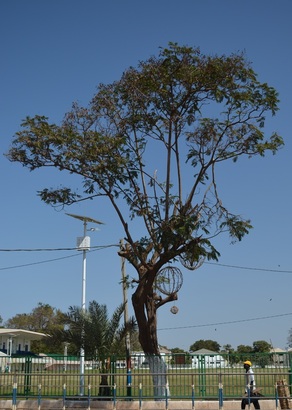 President's Ju-ju Tree
President's Ju-ju Tree We only had a few days in the Gambia, and at the time we were planning to do a loop that would involve Sophie coming back down from the north on her own. This would involve crossing the river Gambia on boats. Reports varied as to how safe this was, from, “Dear sweet God you will surely die and then have your corpse picked over and robbed,” to, “Yeah, it’s fine.” Personally I think that the fact that there is so much package tourism means that most Gambians think that white people are precious little bubbles who will pop if they get nudged, but we set off into Banjul, the capital, to see what the boats looked like.
We were dropped off next to the President’s compound. I started taking photos of what I thought was an art installation, until a passing local told me that photographing the President’s juju could get us into serious trouble. The President is, to put it kindly, borderline mental. He’s been in power now for almost 20 years, and has got steadily more repressive, arbitrarily deciding to kill prisoners, letting it be known he can cure AIDs, and pulling out of the Commonwealth when it criticised him. He’s probably not the kind of guy you want to mess with. We moved on; it was a Sunday and most of the streets were empty, Nelson Mandela Avenue almost eerily so. We popped into the main market, but the number of people who wanted to show us around outnumbered the number of people selling stuff, so we soon retreated and headed down to the port.
We were dropped off next to the President’s compound. I started taking photos of what I thought was an art installation, until a passing local told me that photographing the President’s juju could get us into serious trouble. The President is, to put it kindly, borderline mental. He’s been in power now for almost 20 years, and has got steadily more repressive, arbitrarily deciding to kill prisoners, letting it be known he can cure AIDs, and pulling out of the Commonwealth when it criticised him. He’s probably not the kind of guy you want to mess with. We moved on; it was a Sunday and most of the streets were empty, Nelson Mandela Avenue almost eerily so. We popped into the main market, but the number of people who wanted to show us around outnumbered the number of people selling stuff, so we soon retreated and headed down to the port.
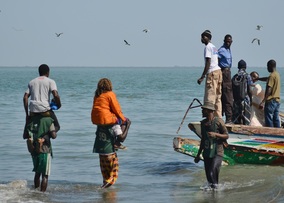
Here we were surrounded by a number of people who, when they found out we were only checking for a future journey, all implored us to remember the number printed on their halberds. It wasn’t immediately clear why or what they did for a living, but as we walked up the rubbish encrusted shore of the river towards the boat launch it became clearer. As there was no pier people had to be carried onto the boats on the porters’ shoulders. They were then paid a tip. I have to say, it looked pretty cool, and the fact that everyone on the boats was wearing lifejackets assuaged some of Sophie’s worries.
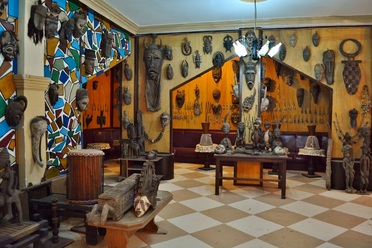
Unfortunately, Sophie was feeling rather the worse for wear, so we ended up spending a bit more time in Gambia than we expected. It turned out to be an excellent decision, though, as we went down to check out the fish market at sunset. The best views are from the terrace of the Bakau Guest Lodge, which looks a bit ramshackle from the main road, but opens out into a charmingly shabby colonial type building once you get inside. It’s lovely to sip a beer and watch the boats come in, see arguments flair as prices are discussed and declared completely unreasonable, whilst shacks on the front fry the fresh catch straight from the sea. Aside from the views over the vibrant market, the lodge doubles as a mask museum. The collection is simply stunning, and spread out over many floors. The quality would put many national museums to shame, and highlights the inventiveness of local carvers and the power of their imagination.
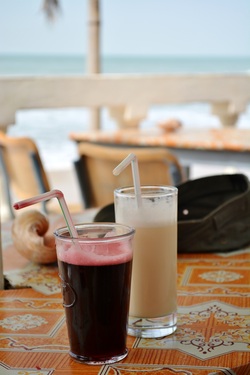 Wanja & Baobob Juice
Wanja & Baobob Juice After dark we were meeting up with a local. Alimamo was a friend of someone we knew who had been coming to the Gambia for years. We thought it would be better for Sophie to have someone meet her when we split and help her get back across the river. Alimamo was a genial Islamic Rasta guy who we felt we could trust, especially as he didn’t drink (though he chugged energy drinks like there was no tomorrow), and we made sure to display lots of affection for each other in front of him just so he wouldn’t get any ideas.
We met in a place he had recommended as doing some of the best Gambian food. Although there wasn’t the widest range of food in the Gambia, when done right it was bloody delicious. Almost all roads were lined with little stalls where women sold either phone credit or peanuts. Both Sophie and I agreed the peanuts were quite the best we’d ever had: we had no idea they could even taste like that. Unsurprisingly, the dish I liked most was Domoda, a rich peanut stew, although Yassa, made with mustard and spices, was also top notch. The juices were also incredible – when we finally took Karl up on his offer of juices he got us to knock up the baobab juice ourselves. The fruit of a baobab tree forms a calcium-ish deposit around the seeds. You load them into a water bottle with another juice, such as orange, then shake it until it all dissolves. The resulting creamy drink is wonderfully tart and supposedly good for stomach aches. Another local favourite is Wanja, purple and ridiculously sweet, and not too far off flat Vimto, which might explain why Vimto was so big in Gambia, out advertising Coke about three to one.
We met in a place he had recommended as doing some of the best Gambian food. Although there wasn’t the widest range of food in the Gambia, when done right it was bloody delicious. Almost all roads were lined with little stalls where women sold either phone credit or peanuts. Both Sophie and I agreed the peanuts were quite the best we’d ever had: we had no idea they could even taste like that. Unsurprisingly, the dish I liked most was Domoda, a rich peanut stew, although Yassa, made with mustard and spices, was also top notch. The juices were also incredible – when we finally took Karl up on his offer of juices he got us to knock up the baobab juice ourselves. The fruit of a baobab tree forms a calcium-ish deposit around the seeds. You load them into a water bottle with another juice, such as orange, then shake it until it all dissolves. The resulting creamy drink is wonderfully tart and supposedly good for stomach aches. Another local favourite is Wanja, purple and ridiculously sweet, and not too far off flat Vimto, which might explain why Vimto was so big in Gambia, out advertising Coke about three to one.
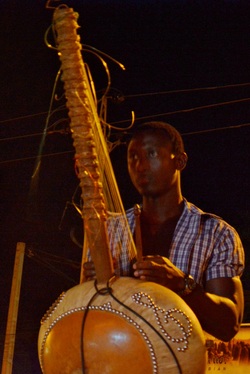 Kora Player
Kora Player The restaurant that Alimamo took us to was good, but the best news was that a band came on afterwards. The music of West Africa is one of its greatest achievements, stretching back to the complex cultures that formed in the medieval empires that stretched across Western Africa. The most characteristic instrument is the kora, made out of a giant gourd, and sounding like a cross between a harp and a guitar. Traditional Griots could play melodies and bass-lines on the kora whilst singing praise songs, passing on oral history or extemporising on current events. Nowadays they are often accompanied by djembe drummers, especially in Gambia, where it sometimes seemed that everyone and their dog had a drumming circle or workshop to try and entice foreigners, irrespective of talent.
This band were fantastic, though, with drummers, a kora player and a singer. The first tune was a praise song to Alimamo himself, who nodded beneficently at this honour. Slowly the tempo picked up, and a dancer came out and started the spastic dancing that is characteristic throughout Senegambia. She was soon joined by most of the locals in the joint, and Soph and I needed little more encouragement. Although we couldn’t quite manage the jerks and spasms of the band’s dancer, we ended up pounding the dancefloor with our new found friends for hours, whilst the rest of the white cliental looked on in a mixture of horror and bemusement.
It was a great way to feel connected to the Gambia, rather than always feeling somewhat on the outside, and the funky, beautiful tunes stayed with us as we rode an 8-8 back to the hotel. The next day we would be leaving for Senegal, so it was good to feel that we had found a way into the culture. Gambia can seem a little predatory and unreal at times, so it’s great every time you get a chance to break through and see how Gambians are when they’re not looking for a way to make money from you. Beaches, peanuts and beautiful music – they’re not the shabbiest memories to take away from a country.
This band were fantastic, though, with drummers, a kora player and a singer. The first tune was a praise song to Alimamo himself, who nodded beneficently at this honour. Slowly the tempo picked up, and a dancer came out and started the spastic dancing that is characteristic throughout Senegambia. She was soon joined by most of the locals in the joint, and Soph and I needed little more encouragement. Although we couldn’t quite manage the jerks and spasms of the band’s dancer, we ended up pounding the dancefloor with our new found friends for hours, whilst the rest of the white cliental looked on in a mixture of horror and bemusement.
It was a great way to feel connected to the Gambia, rather than always feeling somewhat on the outside, and the funky, beautiful tunes stayed with us as we rode an 8-8 back to the hotel. The next day we would be leaving for Senegal, so it was good to feel that we had found a way into the culture. Gambia can seem a little predatory and unreal at times, so it’s great every time you get a chance to break through and see how Gambians are when they’re not looking for a way to make money from you. Beaches, peanuts and beautiful music – they’re not the shabbiest memories to take away from a country.

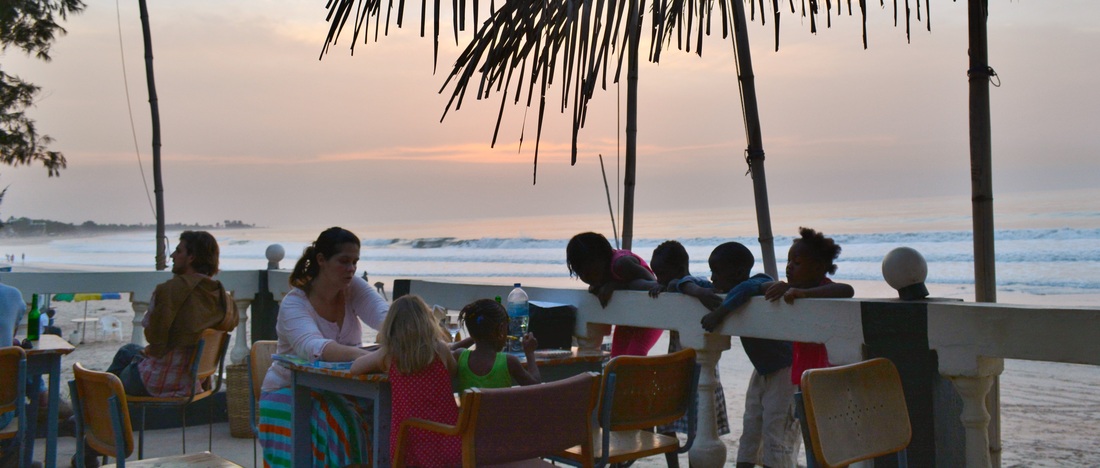
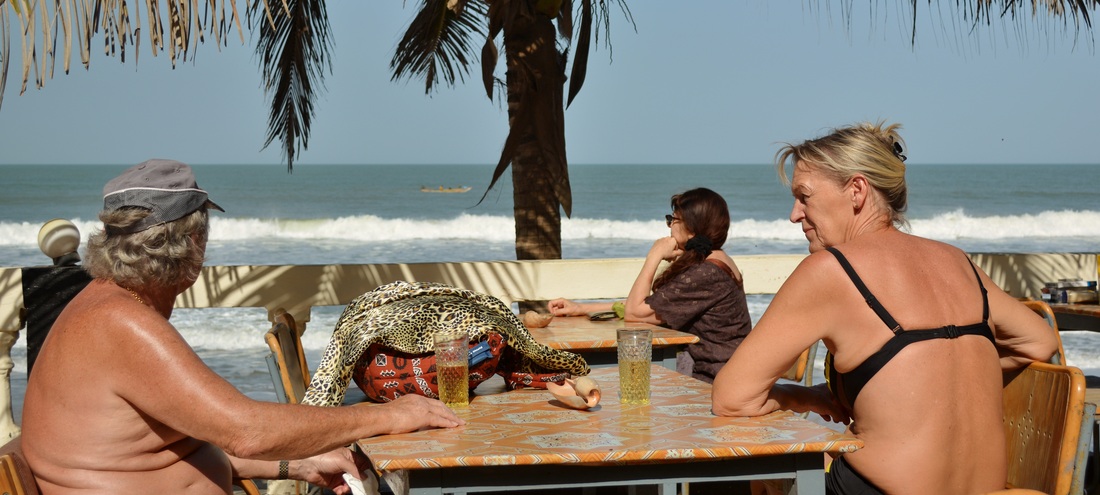
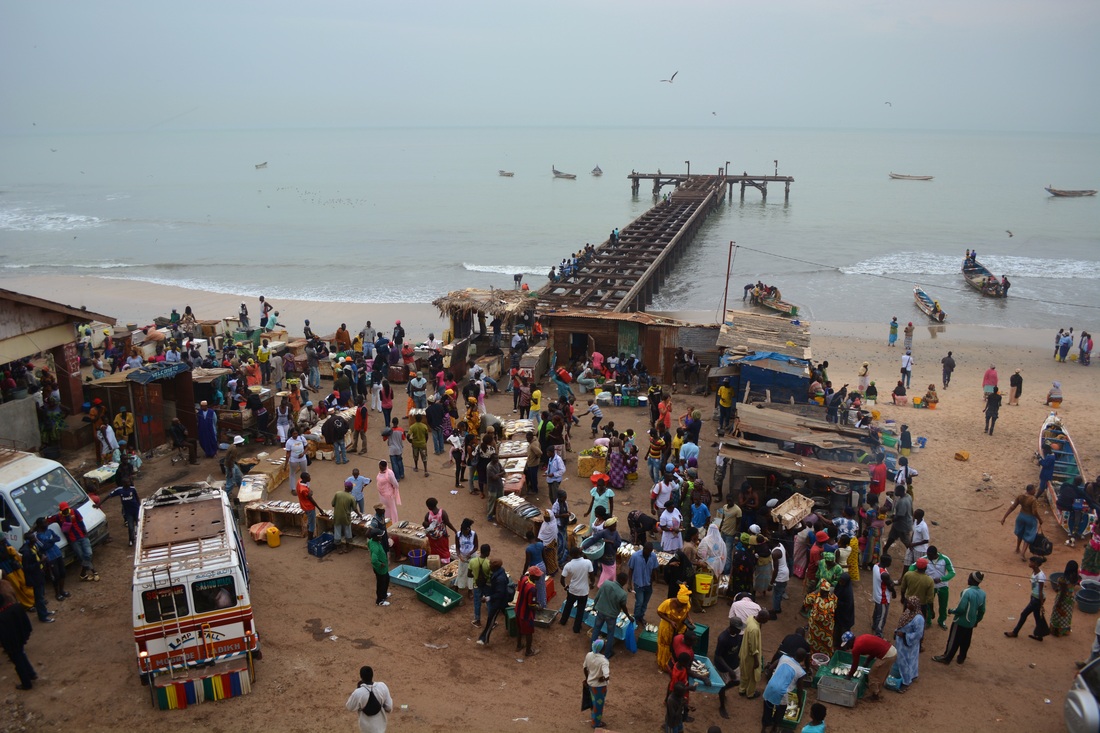
 RSS Feed
RSS Feed
